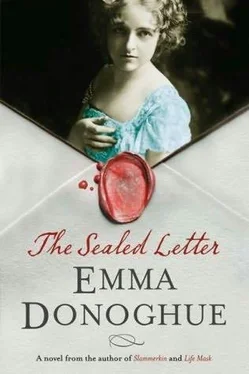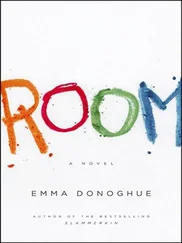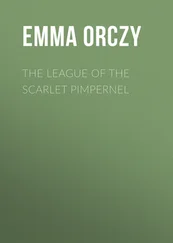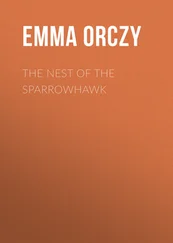She reaches into the bedside drawer for her tin of Sweet Threes and the little box of safety matches. (Fido has a standing order for her cigarettes; they're delivered straight from the factory in Peckham, so she doesn't have to push her way into a tobacconist's once a week, running the gauntlet of smirking men.) The Turkish tobacco in its tube of yellow tissue smells sweetly spiced and nutty-though when she first tried a cigarette, five years ago, it seemed to stink like used horse bedding. She draws the smoke deep into her raw lungs now, and feels her breathing ease at once.
Helen's back. Fido still can't quite believe it.
After her second cigarette she sleeps, a little, and then rings for Johnson to bring up some cold mutton and pickles. She always reads at meals, to make the most of her time and to keep her mental pistons firing. Over her dinner tray she skims the Social Science Association's latest pamphlet on Friendless Girls and How to Help Them. She clucks with irritation when she finds a misspelling she should have spotted in the galleys.
Her attention keeps wandering. What are the odds of running into someone in London? Three and a half million to one, according to the last census. It's not as if the two former friends ran into each other at one of their old Belgravia haunts, or the home of some mutual acquaintance. To happen to glimpse each other on Farringdon Street, in a mob of bankers and porters, only a fortnight after the Codringtons' return to England, with Helen in search of magenta tassels and Fido's head full of printing schedules-it can't be an accident. Such astonishing luck, after the awful mischance of the lost letters that ended their friendship so needlessly. Fido likes to think of her life as self-made, an ingenious machine held in her own two hands… but there's something so fortuitous about today's reunion, she can only attribute it to providence.
Friendless Girls has fallen onto the counterpane. She's back in Kent, all at once, at the spot on Walmer Beach where she first laid eyes on Helen Codrington in 1854. A lady with russet hair, perched like a mermaid on the rocks, those salty blue eyes staring out to sea. Fido was only nineteen, on a visit to help her sister Esther with the new baby, and green with inexperience. Green enough, for instance, to assume that a weeping wife must be grieving the lack of her brave captain (recently posted to the Crimea) rather than the fact of him.
The Reverend and Mrs. Faithfull's union was such a solid edifice, so proper in its manners and substantial in its comforts: what did Fido, at nineteen, understand of the darker games husbands and wives could play? How little she knew of marriage-of anything, she corrects herself now-before she became acquainted with the Codringtons. Before she found herself drawn into the absorbing misery of a principled man and a warm woman who had nothing in common. Nothing to bind them except two little daughters, and the full force of law.
The strange thing was, Fido liked them both. She felt drawn to Helen at once, by instinct, as a bloom opens to a bee. But to tall, bearded Captain Codrington too, as soon as he sailed home that November-when the Crimean winter shut down all possibility of what he called "decent action." She was drawn to his earnestness, his zeal for the Navy, his tenderness with the children; she found him manly in the best sense. And as for him, he took to his wife's new companion at once, paid her the compliment of serious conversation, as if she were something more interesting than a second season debutante. Within a month she'd picked up his wife's un-English habit of calling him Harry. One afternoon, when Helen had had a tantrum over caraway cake and rushed off to her room, Harry confided in Fido how valuable he thought her influence; how much the children treasured their "Aunt Fido"; how he hoped she'd consider Eccleston Square as her home whenever her parents could spare her from the Rectory in Headley. And little by little, without it ever receiving any further discussion, Fido found herself one of the family.
She began with a fount of optimism, not just as Helen's friend but also as a friend to the marriage. Surely the fact that this man and this woman were by nature alien to each other needn't mean that happiness would always be beyond their grasp? If Harry only mellowed a little, approaching his fifties… if he came to appreciate that his young wife's qualities were those of the singing grasshopper more than the industrious ant… if Helen, for her part, could be persuaded to accept the real life she'd chosen, rather than hankering for those chimerical ones she found between yellow paper covers… That was how Fido used to think, in the first years at Eccleston Square.
It embarrasses her to realize that she pictured herself as a sort of Miss Nightingale, lifting her lamp in dark passages. She tried not to take sides, but it was a vain attempt, she sees that now. Harry was away serving his sovereign for long stretches of the mid-1850s, and even when home between campaigns, he couldn't help but stand awkwardly outside the magic circle of the women's intimacy. I used to call her Madre, she thinks now. And sometimes, Little One. It's quite mysterious to Fido, that electric chain of feeling that can link two women of different ages, backgrounds, temperaments; that throb of sympathetic mutuality, that chiming note outside the range of men's hearing. Without understanding it, she's always responded to it as a diviner to the call of water deep underground.
Setting her tray aside, on impulse she gets out of bed, and goes to unlock a little drawer in her bureau. At the very back, rolled up in a piece of linen, she finds the choker. A cheap thing, but nicely made: mother-of-pearl, shells, pebbles of amber, all the small treasures of the Kentish shore, sewn onto a band of black velvet. Helen gave it to her to mark the first anniversary of their meeting, and Fido wore it for the best part of three years. The Codrington years, as she's called them ever since, in the privacy of her head.
She blamed herself at the time; of course she did. The fact is that for all Fido's sensible advice, her loving counsel, the Codrington marriage disintegrated on her watch. She did her best, and her best did no good at all.
Worse than that: by stepping in as a wide-eyed go-between, she became an obstacle. That awful last year, 1857, when Helen shut her bedroom door against her husband, and finally-having wilfully misunderstood a paragraph in the Telegraph about the new Matrimonial Causes Act-made a wild demand for a separation on the basis of incompatibility (as if any such thing existed in law)… Fido still can't sort out the pieces of that puzzle. All she knows is that the more she tried to help, the more entangled she got, the more she tangled matters that she'd have been better off not meddling with in the first place.
All this remembering is hard work, like using a muscle that's gone stiff and sore. There are things she can't look at directly yet; passages in her long history with the Codringtons over which she skips. Those strange, terrible months of quarrels and illnesses towards the end, for instance.
It still makes her blush to the throat to remember that Harry had to ask her to move out. (She ought to have left months before that, but Helen needed her so desperately, and the wound-up, wailing little girls…) He did it in a gentlemanly manner; assured her, "No third party should be obliged to witness such scenes." But Fido stumbled away from Eccleston Square like a child with scorched fingers.
And then in a matter of months, news came that Captain Codrington was to be elevated to the rank of rear admiral and made superintendent of the dockyards at Valetta. His wife and children would accompany him on his first land posting, that was understood; Admiralty House had dozens of rooms, and Helen was one of these rare Englishwomen raised in the tropics for whom the heat held no dangers. So off they went, the whole Codrington ménage. "It'll be a fresh start," Fido remembers telling a tear-stained Helen that summer of '57. "A heaven-sent second chance." She wanted to believe it herself; she was holding out for something like a happy ending.
Читать дальше












